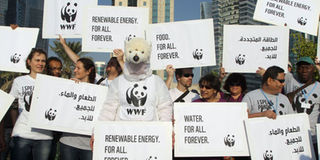Save Africa from climate change 'doom'

Activists carry placards during a rally in Doha on December 1, 2012 to demand urgent action addressing climate change as the United Nations Convention on Climate Change continues in the Qatari capital. The chances of hitting the UN's global warming target are diminishing, but the goal can still be met if greenhouse-gas emissions fall by 15 percent by 2020, scientists said. AFP
African negotiators at the ongoing climate change talks in Doha have called for urgent action to save the continent from "doom".
Emmanuel Dlamini, the chair of the Africa Group of negotiators said the impact of climate change in the continent was both increasing in frequency and intensity pointing out that the talks would provide a historic opportunity to save the continent.
"The Africa group is calling for urgent action in tackling climate change in order to guarantee our survival. Already, more than one billion people are at risk of being affected by climate change,” said Mr Dlamini Saturday.
“If we don’t reduce emissions, then we will be forced to keep on adapting to it untill we become extinct…if nothing is done, we are likely to vanish."
Previous reports have indicated that the devastating impact of climate change, mainly caused by ballooning carbon emissions from rich Western nations, will hit the continent hardest.
They have warned that large African cities will be submerged under rising sea levels, wildlife habitats could disappear, while droughts, which have overwhelmed the Horn of Africa with increasing regularity, will be more common.
Some 70 per cent of people in Africa and nearly 90 per cent of the poor work in agriculture. When rains fail, or are unpredictable, they are forced to rely on emergency food aid.
He spoke as activists from across the Arab region held a peaceful march in Doha, to demand urgent action to address climate change. The march is thought to be the first ever of its kind in the history of modern-day Qatar.
Reduce emissions
The activists from more than 15 Arab countries including Qatar, Mauritania, Morocco, Jordan, Libya, Tunisia, United Arab Emirates, Palestine, Lebanon, Iraq, Algeria, Sudan, Oman, Egypt and Bahrain also called on their own leaders to pledge to reduce their emissions by 2020.
The march was supported by regional and international lobby groups such as IndyACT, OASIS Doha, 350.org, Climate Action Network, and the global TckTckTck campaign, as well as youth activists who were instrumental in the Arab spring and are now organized in the newly founded Arab Youth Climate Movement.
Mr Dlamini said he hoped the negotiations that end next week, will result in a roadmap for lowering green house gas emissions.
“These talks are our only hope. We are optimistic of a meaningful outcome. We are ready to work towards an agreement here in Doha,” said Mr Dlamini.
At the beginning of the negotiations last week, the top UN climate change official Ms Christina Figueres also urged governments to speed up global action towards a low-emission future.
He revealed that they were pressing for the second commitment period for the Kyoto Protocol to run for five years, rather than the planned eight years, in order to increase the ambition of signatory countries' emission reduction targets.
“Africa does not want to see a second commitment period of less than that,” he said.
The negotiations on the second commitment period of greenhouse gases emissions reduction under the Kyoto Protocol have been mired in disagreement between developing and developed countries.
While developing countries want the talks to produce increased ambition in emission reductions for the second commitment period, developed countries on the other hand seem set to maintain their current targets, with uncertainty over the future review of those targets.
However, a host of industrialised nations including the US, Japan, and Canada have said they will not sign up to the agreement, leaving just the EU, Australia, and a handful of other nations committing to binding emission reduction targets under the treaty.
The chairperson stressed that all parties to the protocol agreed on the need to find a legal instrument for the convention in the second commitment period, to mitigate the effects of climate change, reduce green house emissions, as well as adapt to it, and reach a mechanism of technology transfer and financing by developed countries.




